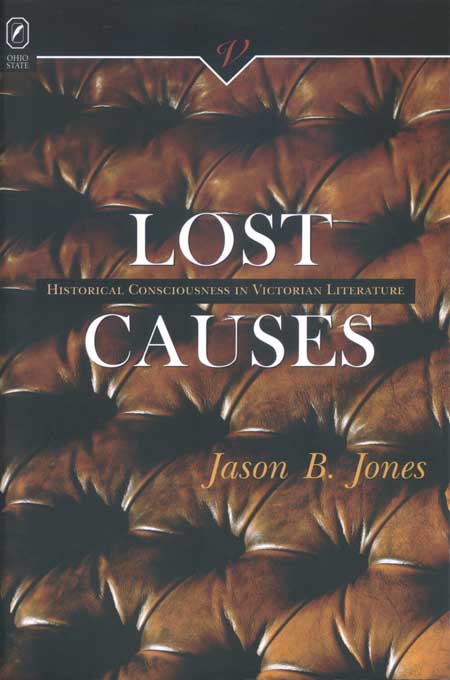click here to read excerpts from the book
 Lost Causes
Lost Causes
Historical Consciousness in Victorian Literature
Jason B. Jones
 “Lost Causes is a highly charged, necessary study that rethinks how we see the Victorians in their
understanding of history, and which, as Jason Jones reveals, is much more complex than many of our
present critical notions, concerning either of history or the Victorians.” —Julian Wolfreys, author of
The Old Story, with a Difference: Pickwick’s Vision
“Lost Causes is a highly charged, necessary study that rethinks how we see the Victorians in their
understanding of history, and which, as Jason Jones reveals, is much more complex than many of our
present critical notions, concerning either of history or the Victorians.” —Julian Wolfreys, author of
The Old Story, with a Difference: Pickwick’s Vision
“Jason Jones’ Lost Causes is an original, timely contribution to Victorian literary and cultural studies. The book is eloquently written, well researched, and persuasively argued. Jones offers a significant revision of traditional assumptions about the nature and status of historical imagination in nineteenth-century British culture, and his account sheds new light on several important aspects of Victorian culture through its entirely new perspective on problems of historical causation.” —John Kucich, University of Michigan
What if we didn’t always historicize when we read Victorian fiction?
Lost Causes shows that Victorian writers frequently appear to have a more supple and interesting understanding of the relationship between history, causality, and narrative than the one typically offered by readers who are burdened by the new historicism. As a return to these writers emphasizes, the press of modern historicism deforms Victorian novels, encouraging us to read deviations from strict historical accuracy as ideological bad faith. By contrast, Jason B. Jones argues through readings of works ranging from The French Revolution to Middlemarch that literature’s engagement with history has to be read otherwise.Perhaps perversely, Lost Causes suggests simultaneously that psychoanalysis speaks pressingly to the vexed relationship between history and narrative, and that the theory is neither a- nor anti-historical. Through his readings of Victorian fiction addressing the recent past, Jones finds in psychoanalysis not a set of truths, but rather a method for rhetorical reading, ultimately revealing how its troubled account of psychic causality can help us follow literary language’s representation of the real. Victorian narratives of the recent past and psychoanalytic interpretation share a fascination with effects that persist despite baffling, inexplicable, or absent causes.
In chapters focusing on Thomas Carlyle, Charles Dickens, Charlotte Brontë, and George Eliot, Lost Causes demonstrates that history can carry an ontological, as well as an epistemological, charge—one that suggests a condition of being in the world as well as a way of knowing the world as it really is. From this point of view, Victorian fiction that addresses the recent past is not a failed realism, as it is so frequently claimed, but rather an exploration of possibility in history.
Jason B. Jones is assistant professor of English at Central Connecticut State University in New Britain.
| Oct 2006 Literary Criticism/European/English 160 pp. 6x9 |
|
| $32.95 paper 978-0-8142-5156-0 | Add paper to shopping cart |
| $92.95 cloth 978-0-8142-1039-0 | Add cloth to shopping cart |
| $14.95 CD 978-0-8142-9117-7 | Add CD to shopping cart |
| Victorian Critical Interventions |


